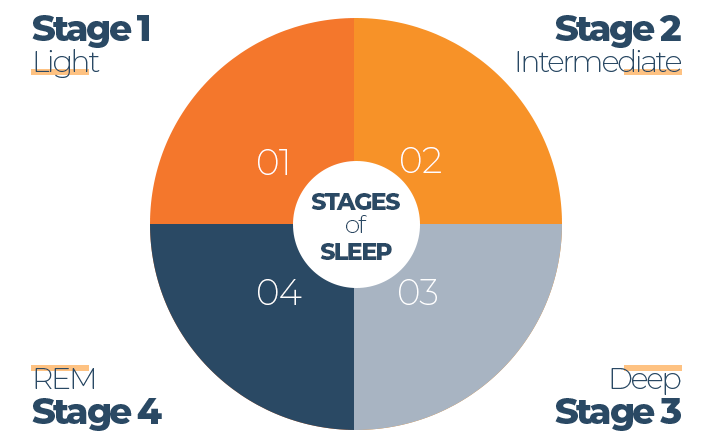There are a lot of reasons you may only get one hour of sleep. Maybe it’s finals week or you’ve got a newborn baby. Whatever your situation might be, facing the possibility of getting only one hour of sleep can be overwhelming. So what do you do, stay up all night or get 60 minutes of shuteye?
This article will highlight the reality of these types of scenarios and what you should know but keep in mind, we do not recommend getting only one hour of sleep at night if it’s possible to avoid this situation.
1 Hour or No Sleep At All?
If you have ever pulled an all-nighter you may have asked yourself, “Is it better to stay up all night or sleep for an hour?”
Well, in truth neither answer would likely serve you best. Completing a sleep cycle takes 90 minutes[1], which is when sleepers should find their most beneficial rest. So, if you can squeeze in 90 minutes, and fit in a few naps later in the day, you may be able to catch up on the rest you need to function.
If getting that extra 30 minutes is not in the cards, then taking a 15 to 20-minute nap may be your best bet. When you wake up after 60 minutes, it is likely you may be getting up during the third stage of sleep, which is categorized as deep sleep. During this phase of rest, you may wake up more groggy and tired than when you fell asleep.
At 90 minutes your body should be in REM, which is rapid eye movement, the stage where you dream. After REM, the cycle repeats itself, going back to Stage 1. The first stage is a light sleep, which means it’s easier to wake up with more energy during this period.
Get More Info: The 4 Stages of Sleep
Should I Sleep for 2 Hours or Stay Up All Night?
Unfortunately, in this situation, two hours may be too much.
Sleeping past the 90-minute mark may put you deeper into your cycle and create more of a problem when it’s time to get up.
In general, the more cycles you can manage to complete, the better. Instead of completing one partway, however, it may be better to get going and grab your favorite cup of coffee with the extra time.
Is Some Sleep Better than No Sleep?
Generally speaking, yes. Most of the time, catching even just a few zzz’s is better than nothing. When you truly have less than one hour, power napping for 20[2] minutes might be your best option. However, if you have the time, try to make it through one 90-minute cycle so you can be more alert until you can catch up on rest.
Learn More: Benefits of Power Nap
Risks of Getting Little Sleep
We do not recommend sleeping for only one hour at night. Some research[3] suggests that lost sleep can take years off your life and that you may not be able to catch up on the lost hours of rest.
This is because consistent sleep deprivation can cause a myriad of chronic health issues[4] in people over time. These include:
- Heart disease
- Kidney disease
- High blood pressure
- Diabetes
- Stroke
- Obesity
- Depression
Plus, even short-term sleep deprivation is linked to an increased risk for injuries in adults and teens as it can compromise our ability to make decisions and even our motor function. For example, sleepiness while driving is responsible for car crashes and serious wrecks, and in older people, sleep deprivation is linked to an increased risk of falling and breaking bones4.
We want to be clear in saying that getting 90 minutes of sleep isn’t preferable to a full 8 hours, especially if you’re going to be driving or working in a high-risk environment. When your body is sleep-deprived, you could experience microsleeps or short lapses in consciousness that can have dangerous consequences. If you’re sleep deprived, even from just one night, you should consider postponing or rescheduling anything that could be dangerous until you have slept and feel rested.
Want to know more? See how one night of poor sleep affects our health.
Conclusion
Whether it’s a study binge, a late night on a work project, or Netflix, sometimes we don’t get a full night’s sleep. If you’re in a situation where you have to choose between one or two hours of sleep or no sleep at all, here is how you should look at it:
If you have only one hour available to you, take a 20-minute power nap instead of sleeping for the full hour. This is because your sleep cycle lasts 90 minutes and waking up at the 60-minute mark when you are still in deep sleep, will leave you feeling groggier than before.
If you have two hours available to you, sleep for 90 minutes instead of the full two hours. This is because you will get one full sleep cycle in and will likely wake up when you’re about to go from REM sleep to a light sleep, leaving you more alert and refreshed.

Jill Zwarensteyn
Editor
About Author
Jill Zwarensteyn is the Editor for Sleep Advisor and a Certified Sleep Science Coach. She is enthusiastic about providing helpful and engaging information on all things sleep and wellness.
Combination Sleeper
Sources:
- Patel, Aakash K., Reddy, Vamsi., Shumway, Karlie R., Araujo, John F. “Physiology, Sleep Stages”. National Library of Medicine. 2024.
- “Making the most of a short nap”. Harvard Health. 2008.
- Ferrie, Jane E., Shipley, Martin J., et. al. “A prospective study of change in sleep duration: associations with mortality in the Whitehall II cohort”. Sleep. 2007.
- “What are Sleep Deprivation and Deficiency?”. National Heart, Lung, and Blood Institute. Last modified March 24, 2024.
